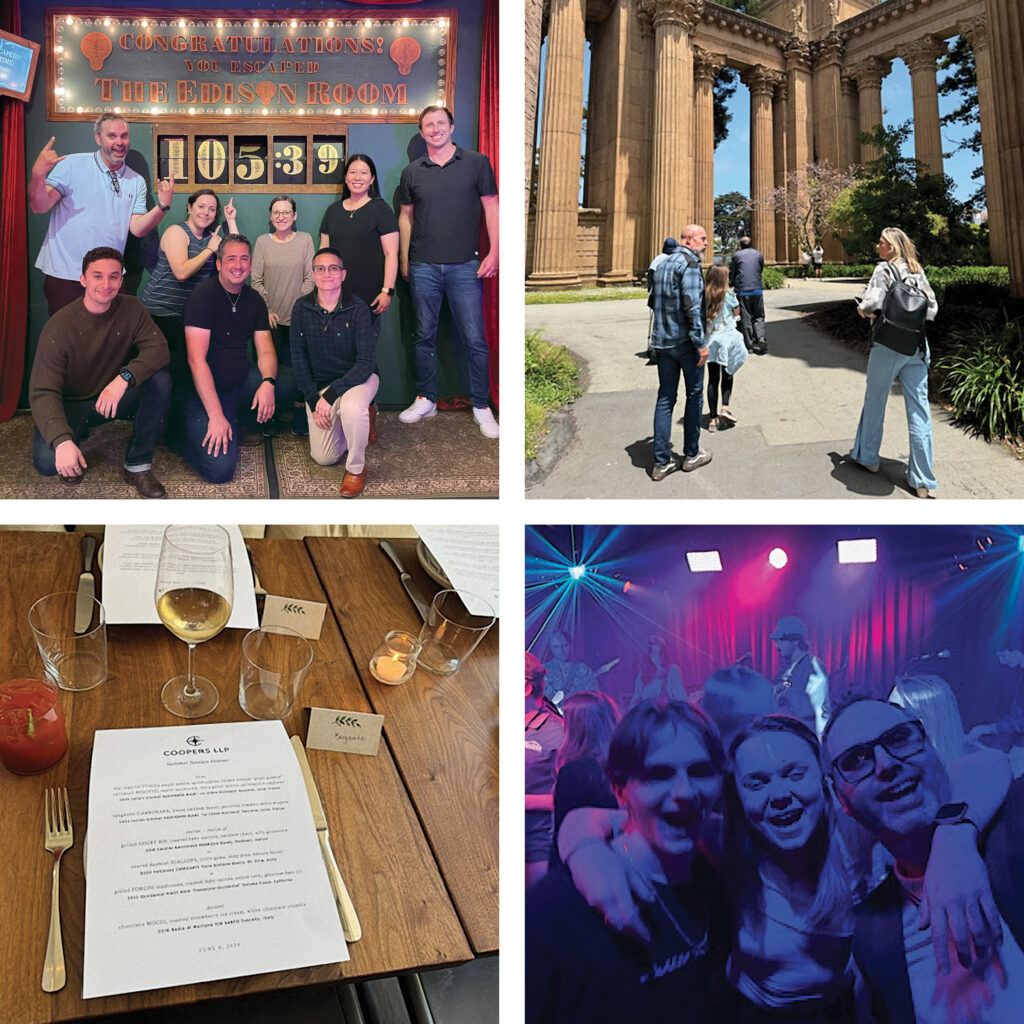In a post-pandemic world, firms’ work environments vary widely: from being back in the office, to fully remote, to something in between. The differing styles sometimes reflect stereotypical demographic attitudes toward knowledge work. Some more seasoned lawyers trend toward in-person work. Collaboration and mentoring didn’t work without five senses interactions, they feel. Yet the most senior folks, the ones who could generate that collaborative benefit, when pushed, tend to admit they are not in the office as frequently as they expect the staff and junior lawyers to be. Less tenured lawyers tend to be much more comfortable working in a dispersed manner. So how does one collaborate, mentor, and maintain firm culture when not everyone comes to the office regularly anymore?
All in
The firms that rotated back to all in-person, all the time, benefit from regular human interaction. Maintaining firm culture, keeping the office doors open to collaborate, grabbing lunch, mentoring: these flow more easily with a traditional office. They cannot be put on autopilot, however. Team building requires conscious effort. Simultaneously, full-time in-person work creates talent and productivity risks. Deep work is best done without interruption, for one. Additionally, with so many hybrid options available, top talent may decide that firms with more flexibility better meet their needs. Fewer commutes mean more time. Flexible hours are attractive, particularly for those with children or other obligations. Is an in-person mandate worth losing talented parents?
A common concern? Unwatched workers aren’t actually working (or aren’t working as hard as they should be.) A little secret: shirker employees shirk just as much in the office as out. There are plenty of places to hide in knowledge work, where widget production per hour cannot be measured. For more on this, dig into Douglas McGregor’s Theory X and Theory Y human work motivation and management. Theory X managers trend toward heightened supervision, external rewards, and penalties. They tend to attract Theory X employees, who require heightened supervision, rewards, and penalties, i.e., heavy managerial input, to perform. Contrast Theory Y, which relies on job satisfaction and less direct supervision. Theory Y managers attract Theory Y workers. Theory Y teams trend happier and tend to outperform Theory X teams. And Theory Y teams don’t require in-office supervision.
The question in-person firms should ask themselves: Is the in-office requirement truly a mentoring and collaborating tool or simply a Theory X environment where workers are distrusted? One metric for this: are senior members in the office five (or six, or seven) days a week, or do they espouse in-office work for the staff while rarely making it into the office themselves? If the latter, one should acknowledge one operates a Theory X environment. There’s nothing wrong with that. Just know that the beatings there will continue until morale improves.
Remote control
Other firms gave up leases and in-office work entirely. They run dispersed workforces. The pros here are reduced cost, flexible work schedules, and more hours in the day without commute or aesthetic worries. Pajama bottoms all day! The cons are the slow evaporation of firm culture and the risk of work ethic slippage. The ethic shift can go either way — less work or working all the time. Neither shift is good for long-term knowledge worker success. Dispersed workforces can be successful at mentoring and collaboration. They can even maintain firm culture. But success requires very intentional efforts. What does that look like? Weekly short (15 minute) all hands video huddles to celebrate wins, share news, and communicate. Regular one-on-ones with reports. Office hours for leaders. The willingness to spend on semi-annual in-person get-togethers to deepen working relationships. Developing these requires heightened efforts that can be challenging in busy litigation environments. They stretch the comfort zone for small business consumer lawyers, most lacking any formal corporate, business, or management training. In some ways the in-person environment can be an easier one to operate.
Hybrid
We now come to what some perceive as the Goldilocks solution. Some in-office, some remote. There are innumerable ways to establish this. Many today require a certain number of days in the office, with the remaining days being flexible. To the extent the format allows for fully remote participants one needs to make sure the system remains fundamentally fair. Allowing some to be fully remote while forbidding others can seem arbitrary and could lead to disgruntlement (or worse). Without effort the remote folks can be overlooked. Regular conscious efforts to incorporate remote members increase their likelihood for success and remaining a part of the team.
Outro
So, what path did Coopers choose? We want our people to be able to perform at their best. For some, that’s in person. For others it’s remote work. We’ve found that, with effort, we can continue to be a teaching law firm with a dispersed workforce. There are many ways to slay corporate dragons. The best one? Whatever works for you and your firm.
Highlights from Coopers 2024 Summer Session
“From the roundtable gathering on arrival, lunch with the entire team, and the department-based escape room activity, they were all a great way to have impromptu discussions regarding ways to improve firm procedures, develop better communication styles, and learn a bit more about each other outside of #worklifebalance.” — Kay Sandoval
“I really like seeing presentations by various departments and getting a better understanding of their roles and processes. While of course this can be done online, there is nothing like the dynamic of in-person interactions and then being able to follow up one-on-one during breaks and social activities.” — Canice Flanagan
“I had just started working and it was wonderful to meet everyone in person and get to know a bit more about them, their roles, and responsibilities! It was a well planned and executed company event. The escape room experience and the exceptionally delicious food at Frances was a wonderful treat!” — Preeti Zalavadia

Coopers LLP helps seriously injured people and accepts referrals and co-counsel opportunities from lawyers. We excel in strategizing. Have a matter you’d like to brainstorm? Contact us at (415) 434-2111 or info@coopers.law.
Coopers LLP has lawyers licensed in California, Oregon, and Washington State, and can affiliate with local counsel on matters where Coopers can make the difference.


